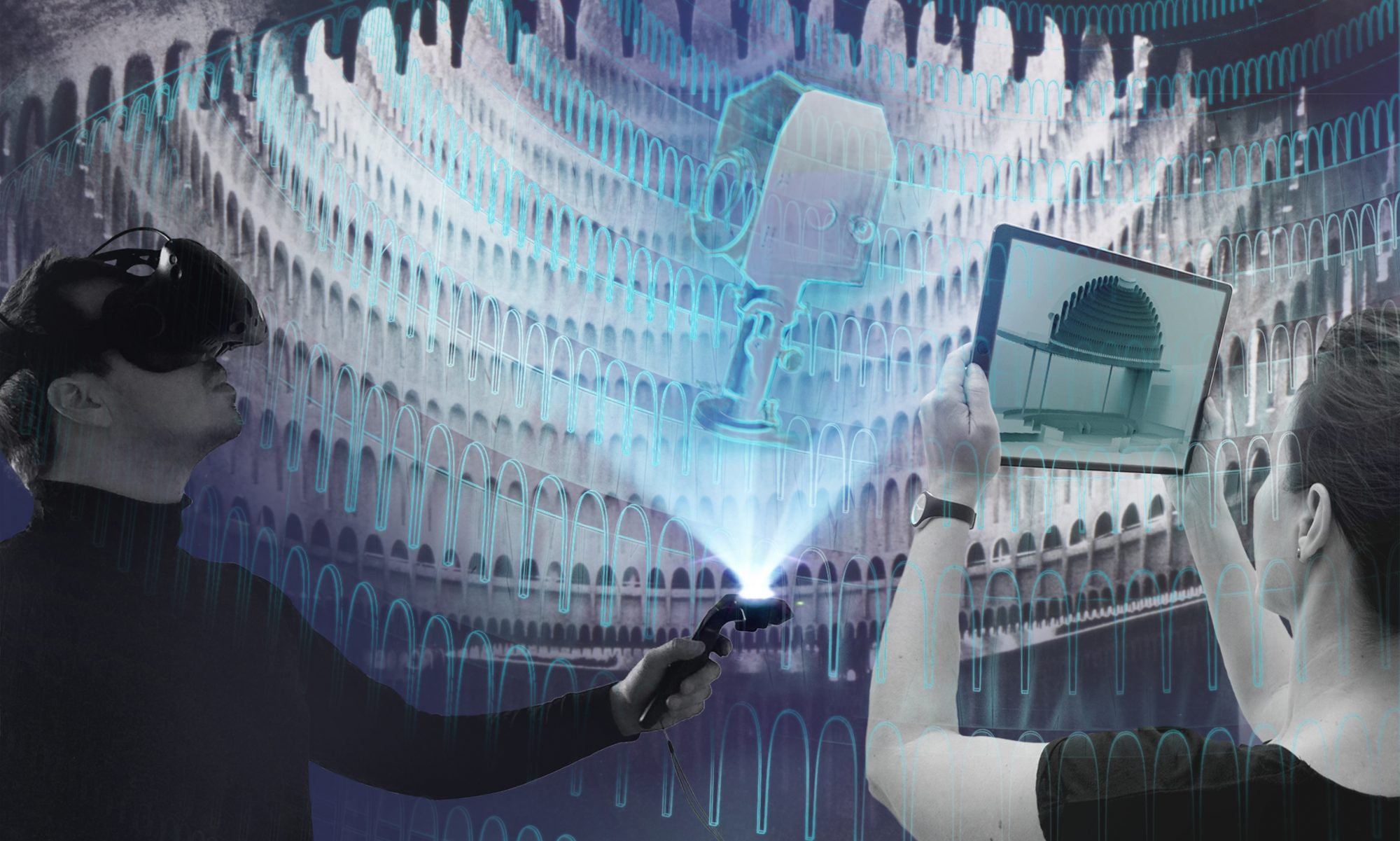Learning by doing or in-depth training? Bachelor’s, master’s or continuing education? How can the digital transformation be driven forward in the theater?
There is still little sign of the digital revolution in higher education. Although digital technologies such as virtual reality are finding their way into educational institutions in many places and artistic courses are trying out interventions on the digital stage, the transfer of knowledge on digital topics in the theater usually takes place in minor subjects (3D renderings, visualization techniques) or in semester projects with guest lecturers. There are not yet any sustainable study or training programs on immersive technologies in the theater.
Nevertheless, it is worth taking a look at the training centers and continuing education opportunities:
The Academy for Theater and Digitality Dortmund: https://theater.digital/
The Academy for Theater and Digitality is a model project of Theater Dortmund for digital innovation, artistic research and technology-oriented education and training. The academy sees itself as a place of innovation, inspiration, discourse, exchange, a place for reflection, networking, giving impulses and communication – a place of art! Funded by the German Federal Cultural Foundation, the Academy will award a total of 54 fellowships in 2019 – 2022 for five months each. The call is aimed at fellows interested in researching artistic-technical contexts in theatrical spaces as well as their practical implementation. In 2021, work began on the nearly 2,200-square-meter new academy building on Speicherstraße at the Port of Dortmund.
Bruford College, Great Britain:
https://www.bruford.ac.uk/learn/undergraduate-courses/virtual-theatre-and-digital-experiences/–
To date, the only offering in the field of new technologies with a clear theater connection! The bachelor’s degree program “Virtual Theatre and Digital Experiences” (starting in fall 2022) provides the skills to design and create sophisticated virtual worlds using the very latest technology.
HfM Trossingen Landeszentrum: https://www.hfm-trossingen.de/hochschule/landeszentrum
The State Center MUSIC-DESIGN-PERFORMANCE at the State University of Music Trossingen builds bridges between the traditions of artistic disciplines and the innovative approaches of our digital age for artistic practice, research and teaching. In the sense of a studio, it creates new spaces for the preservation and continuation of the musical-artistic heritage and questions medial sound design.
HTW Berlin – Aurora School for Artists: https://aurora.htw-berlin.de
The AURORA School for ARtists at the Berlin University of Applied Sciences (HTW) trains art and culture professionals in augmented reality (AR) and digital media production. For this purpose, it is supported by the European Regional Development Fund. The AURORA courses are offered once every six months and are free of charge. In the AURORA production lab, some of the AR apps designed can also be realized with the support of the AURORA team.
Wav Lab München: https://www.wavelab.io/
The Wavelab is the innovation lab and startup center of the University of Music and Performing Arts Munich – a startup center that aims to spark curiosity about innovation, entrepreneurship and new business models among creatives and students, while providing a place for ventures at the intersection of music, arts & media with new technologies.

Photo Credits: Academy for Theater and Digitality, 2021
In addition, there are a large number of state and private degree programs, with a focus on game / media and/or interaction design.
Film University Babelsberg Konrad Wolf: https://www.filmuniversitaet.de/studium/studienangebot/masterstudiengaenge/creative-technologies
The master’s program “Creative Technologies” is an interdisciplinary course of study that combines elements of computer science, film and media design studies. It enables software development to be understood and used as an artistic-creative tool. With this knowledge, digital technologies can not only be applied, but also further developed and new forms of creative-artistic expression can be created.
FH Darmstadt – Program “Expanded Realities”: https://er.mediencampus.h-da.de/
The international Bachelor of Arts “Expanded Realities” at Darmstadt University of Applied Sciences offers an innovative, interdisciplinary and practice-oriented curriculum that integrates relevant artistic, technological, cultural and methodological dimensions of immersive media productions. Faculty resources include state-of-the-art software and hardware, a motion-capturing studio, a games and virtual reality lab, fully equipped film and sound studios, and a usability lab. Over seven semesters, the project-based program qualifies students for careers in the growing field of design, development, production, and marketing of virtual, augmented, and mixed reality applications, such as VR/AR designers, VR/AR developers, VR/AR producers.
International Film School Cologne – Master Program “Digital Narratives”:
https://www.filmschule.de/lehre/lehrgebiete/digital-narratives/
The international MA Digital Narratives at ifs offers dedicated media and culture professionals the opportunity to develop and produce stories with and for the future of digital media. The master’s program combines creative processes of dramaturgy and design with theoretical studies in the fields of media and cultural studies.
De:HIVE HTW Berlin: https://gamedesign.htw-berlin.de/dehive
The DE:HIVE at HTW Berlin combines research, teaching and entrepreneurship. Researchers, founders, teachers, and a total of over 180 students work together in the connected spaces on the topic of play and its social and artistic perspectives.
MDH Berlin: https://www.mediadesign.de/studium/bachelor-studium/game-design-bsc
In addition to game design and media design, the Mediadesign Hochschule Berlin / Munich / Düsseldorf also offers digital film and digital leadership courses.
University of Europe for Applied Sciences (UE): https://www.ue-germany.com/programmes/tech-and-software/master/visual-and-experience-design
The UE (in Hamburg, Iserlohn and Berlin / Potsdam) teaches with its study programs (M.A) Visual Experience Design & Digital Interaction Design the basics of Software Engineering, Data Science up to Visual Experience or UX Design. This often includes practical projects in the cultural sector.
Filmakademie Ludwigsburg: https://animationsinstitut.de/de/studium/studienvertiefungen/interactive-media
The Interactive Media program focuses on the conception, design and implementation of interactive media projects. Students experiment in interdisciplinary teams and develop innovative games, apps, VR experiences, media installations and other interactive experiences.
Author: Franziska Ritter


